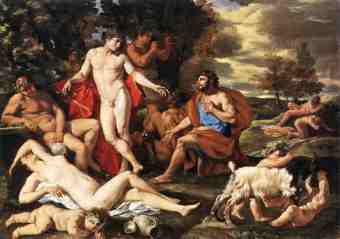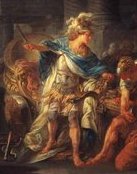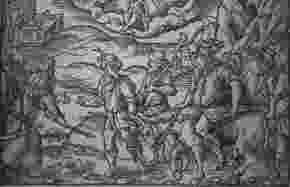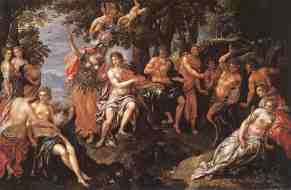
Chapter VI: Midas, Baucis and Philemon
BACCHUS, on a certain occasion, found his old schoolmaster and foster–father, Silenus, missing. The old man had been drinking, and in that state wandered away, and was found by some peasants, who carried him to their king, Midas. Midas recognized him, and treated him hospitably, entertaining him for ten days and nights with an unceasing round of jollity.
[ See: Wine, Women, and Song ]
[ See: The Wrath of Grapes ]
On the eleventh day he brought Silenus back, and restored him in safety to his pupil. Whereupon Bacchus offered Midas his choice of a reward, whatever he might wish. He asked that whatever he might touch should be changed into gold. Bacchus consented, though sorry that he had not made a better choice.
Midas went his way, rejoicing in his new–acquired power, which he hastened to put to the test. He could scarce believe his eyes when he found a twig of an oak, which he plucked from the branch, become gold in his hand. He took up a stone; it changed to gold. He touched a sod; it did the same. He took up an apple from the tree; you would have thought he had robbed the garden of the Hesperides. His joy knew no bounds, and as soon as he got home, he ordered the servants to set a splendid repast on the table.
Then he found to his dismay that whether he touched bread, it hardened in his hand; or put a morsel to his lip, it defied his teeth. He took a glass of wine, but it flowed down his throat like melted gold.

Midas and Bacchus by Nicolas Pousin. Painted 1629-30 From the Alte Pinakothek, Munich
In consternation at the unprecedented affliction, he strove to divest himself of his power; he hated the gift he had lately coveted. But all in vain; starvation seemed to await him. He raised his arms, all shining with gold, in prayer to Bacchus, begging to be delivered from his glittering destruction.
Bacchus, merciful deity, heard and consented.
“Go,” said he, “to River Pactolus, trace its fountain–head, there plunge yourself and body in, and wash away your fault and its punishment.”
He did so, and scarce had he touched the waters before the gold–creating power passed into them, and the river sands became changed into gold, as they remain to this day.
Thenceforth Midas, hating wealth and splendour, dwelt in the country, and became a worshipper of Pan, the god of the fields.
On a certain occasion Pan had the temerity to compare his music with that of Apollo, and to challenge the god of the lyre to a trial of skill. The challenge was accepted, and Tmolus, the mountain god, was chosen umpire.
The senior took his seat, and cleared away the trees from his ears to listen. At a given signal Pan blew on his pipes, and with his rustic melody gave great satisfaction to himself and his faithful follower Midas, who happened to be present.
Then Tmolus turned his head toward the Sun–god, and all his trees turned with him. Apollo rose, his brow wreathed with Parnassian laurel, while his robe of Tyrian purple swept the ground. In his left hand he held the lyre, and with his right hand struck the strings. Ravished with the harmony, Tmolus at once awarded the victory to the god of the lyre, and all but Midas acquiesced in the judgment. He dissented, and questioned the justice of the award. Apollo would not suffer such a depraved pair of ears any longer to wear the human form, but caused them to increase in length, grow hairy, within and without, and movable on their roots; in short, to be on the perfect pattern of those of an ass.
Mortified enough was King Midas at this mishap: but he consoled himself with the thought that it was possible to hide his misfortune, which he attempted to do by means of an ample turban or head–dress. But his hair–dresser of course knew the secret. He was charged not to mention it, and threatened with dire punishment if he presumed to disobey. But he found it too much for his discretion to keep such a secret; so he went out into the meadow, dug a hole in the ground, and stooping down, whispered the story, and covered it up.
Before long a thick bed of reeds sprang up in the meadow, and as soon as it had gained its growth, began whispering the story, and has continued to do so, from that day to this, every time a breeze passes over the place.
The story of King Midas has been told by others with some variations. Dryden, in the “Wife of Bath’s Tale,” makes Midas’s queen the betrayer of the secret:
“This Midas knew, and durst communicate
To none but to his wife his ears of state.”
[ See: The Wife of Bath's Tale ]
 Detail from
"Alexander cuts the Gordian Knot", by Jean-Simon
Berthélemy
Detail from
"Alexander cuts the Gordian Knot", by Jean-Simon
BerthélemyMidas was king of Phrygia. He was the son of Gordius, a poor countryman, who was taken by the people and made king, in obedience to the command of the oracle, which had said that their future king should come in a wagon. While the people were deliberating, Gordius with his wife and son came driving his wagon into the public square.
Gordius, being made king, dedicated his wagon to the deity of the oracle, and tied it up in its place with a fast knot. This was the celebrated Gordian knot, which, in after times it was said, whoever should untie should become lord of all Asia. Many tried to untie it, but none succeeded, till Alexander the Great, in his career of conquest, came to Phrygia. He tried his skill with as ill success as others, till growing impatient he drew his sword and cut the knot. When he afterwards succeeded in subjecting all Asia to his sway, people began to think that he had complied with the terms of the oracle according to its true meaning.
[ See: Proserpine and Midas, by Mary Shelley ]
BAUCIS AND PHILEMON.

Jupiter and Mercury at Philemon and Baucis by
Johann Karl Loth, c1659.
From The Kunsthistorisches Museum, Vienna
On a certain hill in Phrygia stands a linden tree and an oak, enclosed by a low wall. Not far from the spot is a marsh, formerly good habitable land, but now indented with pools, the resort of fen–birds and cormorants.
Once on a time Jupiter, in human shape, visited this country, and with him his son Mercury (he of the caduceus), without his wings. They presented themselves, as weary travellers, at many a door, seeking rest and shelter, but found all closed, for it was late, and the inhospitable inhabitants would not rouse themselves to open for their reception.
At last a humble mansion received them, a small thatched cottage, where Baucis, a pious old dame, and her husband Philemon, united when young, had grown old together. Not ashamed of their poverty, they made it endurable by moderate desires and kind dispositions.
One need not look there for master or for servant; they two were the whole household, master and servant alike. When the two heavenly guests crossed the humble threshold, and bowed their heads to pass under the low door, the old man placed a seat, on which Baucis, bustling and attentive, spread a cloth, and begged them to sit down. Then she raked out the coals from the ashes, and kindled up a fire, fed it with leaves and dry bark, and with her scanty breath blew it into a flame. She brought out of a corner split sticks and dry branches, broke them up, and placed them under the small kettle.
Her husband collected some pot–herbs in the garden, and she shred them from the stalks, and prepared them for the pot. He reached down with a forked stick a flitch of bacon hanging in the chimney, cut a small piece, and put it in the pot to boil with the herbs, setting away the rest for another time. A beechen bowl was filled with warm water, that their guests might wash. While all was doing, they beguiled the time with conversation.
On the bench designed for the guests was laid a cushion stuffed with sea–weed; and a cloth, only produced on great occasions, but ancient and coarse enough, was spread over that. The old lady, with her apron on, with trembling hand set the table. One leg was shorter than the rest, but a piece of slate put under restored the level. When fixed, she rubbed the table down with some sweet–smelling herbs. Upon it she set some of chaste Minerva’s olives, some cornel berries preserved in vinegar, and added radishes and cheese, with eggs lightly cooked in the ashes. All were served in earthen dishes, and an earthenware pitcher, with wooden cups, stood beside them. When all was ready, the stew, smoking hot, was set on the table. Some wine, not of the oldest, was added; and for dessert, apples and wild honey; and over and above all, friendly faces, and simple but hearty welcome.
Now while the repast proceeded, the old folks were astonished to see that the wine, as fast as it was poured out, renewed itself in the pitcher, of its own accord. Struck with terror, Baucis and Philemon recognized their heavenly guests, fell on their knees, and with clasped hands implored forgiveness for their poor entertainment. There was an old goose, which they kept as the guardian of their humble cottage; and they bethought them to make this a sacrifice in honour of their guests. But the goose, too nimble, with the aid of feet and wings, for the old folks, eluded their pursuit, and at last took shelter between the gods themselves. They forbade it to be slain; and spoke in these words:
“We are gods. This inhospitable village shall pay the penalty of its impiety; you alone shall go free from the chastisement. Quit your house, and come with us to the top of yonder hill.”
They hastened to obey, and, staff in hand, laboured up the steep ascent. They had reached to within an arrow’s flight of the top, when, turning their eyes below, they beheld all the country sunk in a lake, only their own house left standing. While they gazed with wonder at the sight, and lamented the fate of their neighbours, that old house of theirs was changed into a temple. Columns took the place of the corner posts, the thatch grew yellow and appeared a gilded roof, the floors became marble, the doors were enriched with carving and ornaments of old. Then spoke Jupiter in benignant accents:
“Excellent old man, and woman worthy of such a husband, speak, tell us your wishes; what favour have you to ask of us?”
Philemon took counsel with Baucis a few moments; then declared to the gods their united wish, “
We ask to be priests and guardians of this your temple; and since here we have passed our lives in love and concord, we wish that one and the same hour may take us both from life, that I may not live to see her grave, nor be laid in my own by her.”
Their prayer was granted. They were the keepers of the temple as long as they lived. When grown very old, as they stood one day before the steps of the sacred edifice, and were telling the story of the place, Baucis saw Philemon begin to put forth leaves, and old Philemon saw Baucis changing in like manner. And now a leafy crown had grown over their heads, while exchanging parting words, as long as they could speak.
“Farewell, dear spouse,”
they said, together, and at the same moment the bark closed over their mouths. The Tyanean shepherd still shows the two trees, standing side by side, made out of the two good old people.
[ See: The Worship of Trees ]
[ See: The Folklore Of Plants ]
The story of Baucis and Philemon has been imitated by Swift, in a burlesque style, the actors in the change being two wandering saints, and the house being changed into a church, of which Philemon is made the parson. The following may serve as a specimen:
“They scarce had spoke, when, fair and soft,
The root began to mount aloft;
Aloft rose every beam and rafter;
The heavy wall climbed slowly after.
The chimney widened and grew higher,
Became a steeple with a spire.
The kettle to the top was hoist,
And there stood fastened to a joist,
But with the upside down, to show,
Its inclination for below;
In vain, for a superior force,
Applied at bottom, stops its course;
Doomed ever in suspense to dwell,
‘Tis now no kettle, but a bell.
A wooden jack, which had almost
Lost by disuse the art to roast,
A sudden alteration feels.
Increased by new intestine wheels;
And, what exalts the wonder more,
The number made the motion slower;
The flier, though ‘t had leaden feet,
Turned round so quick you scarce could see ‘t;
But slackened by some secret power,
Now hardly moves an inch an hour.
The jack and chimney, near allied,
Had never left each other’s side:
The chimney to a steeple grown,
The jack would not be left alone;
But up against the steeple reared,
Became a clock, and still adhered;
And still its love to household cares
By a shrill voice at noon declares,
Warning the cook-maid not to burn
That roast meat which it cannot turn.
The groaning chair began to crawl,
Like a huge snail, along the wall;
There stuck aloft in public view,
And with small change, a pulpit grew.
A bedstead of the antique mode,
Compact of timber many a load,
Such as our ancestors did use,
Was metamorphosed into pews,
Which still their ancient nature keep
By lodging folks disposed to sleep.”
[ See: Baucis and Philemon by Jonathan Swift - On the ever-lamented loss of the two Yew-trees ]
[ See: The Story of Baucis and Philemon ]
Metamorphoses Book XI: Contest of Apollo
and Pan (Midas with Asses' Ears)
Metamorphoses Book XI: Silenus and Midas, Solis
The Punishment of Midas by Hendrik de Clerck, c.1620
From The Rijksmuseum, Amsterdam




